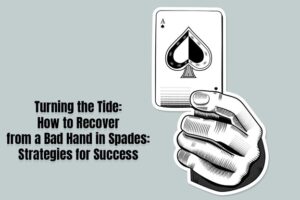 Spades is a card game beloved for its blend of strategy, partnership, and unpredictability. Every player, no matter how skilled, eventually faces the challenge of playing a bad hand. A hand that lacks high-value cards or trumps can feel like a setback, but success in Spades is less about the cards you’re dealt and more about how you play them. With a measured approach, even a weak hand can be used to maintain competitiveness and minimize damage.
Spades is a card game beloved for its blend of strategy, partnership, and unpredictability. Every player, no matter how skilled, eventually faces the challenge of playing a bad hand. A hand that lacks high-value cards or trumps can feel like a setback, but success in Spades is less about the cards you’re dealt and more about how you play them. With a measured approach, even a weak hand can be used to maintain competitiveness and minimize damage.
The Spades card game offers plenty of opportunities to recover even when the odds seem stacked against you. By focusing on smart strategies, cooperative gameplay, and effective decision-making, you can turn a difficult hand into a manageable one. Let’s dive into what makes a hand “bad” and explore practical strategies to transform your weakest cards into tools for success.
Let’s dive into what makes a hand “bad” and explore practical strategies to turn even the weakest hand into an opportunity for recovery.
Understanding a Bad Hand in Spades
A bad hand in Spades is one where your potential to win tricks is limited. Perhaps your hand lacks high-value cards like Aces and Kings, or it contains very few Spades—the trump cards that dominate in many situations. Alternatively, your cards might be a mix of middle-ranking values, which aren’t strong enough to win but also can’t be discarded safely without risk.
For example, a hand filled with 7s, 8s, and 9s across multiple suits can make you feel trapped. Similarly, an uneven distribution of cards, such as holding many cards in one suit and none in others, limits your flexibility. Recognizing these challenges at the start of the round allows you to adopt the right strategies and avoid unnecessary risks.
Bidding Smartly with a Weak Hand
Bidding in Spades is where you begin to set the tone for the round. When you’re dealt a bad hand, your first priority is to bid realistically and avoid overcommitting.
If your cards don’t offer much promise, bid conservatively. For instance, if the strongest card in your hand is an Ace of Hearts, it’s safe to bid one trick and focus solely on securing that win. Overbidding with a weak hand risks penalties that could set your team back significantly. It’s always better to bid low and exceed expectations than to fall short.
For hands that are exceptionally weak, consider a nil bid, where you commit to winning no tricks during the round. Nil bids are effective when your cards lack high values or Spades that might accidentally take tricks. If you’re supported by a capable partner who can “cover” your plays, a successful nil bid can add 100 points to your score, helping offset any prior deficits. However, executing a nil bid requires careful discarding and avoiding situations where you’re forced to win tricks unintentionally.
If your team is trailing by a wide margin and desperate for points, a blind nil bid may be worth considering. This bold move, made without seeing your cards, can yield 200 points if successful. While highly risky, it’s sometimes the only path to a dramatic turnaround.
Making the Most of Your Partner’s Role
Spades is a partnership game, and when you have a weak hand, your partner’s role becomes even more critical. Strong teamwork can compensate for your limitations and ensure your team stays competitive.
If you bid low, your partner should adjust their bid based on their hand’s strength. For example, if you bid one trick due to your weak hand, your partner might bid higher to balance the team’s total bid. This cooperative approach ensures the team’s overall bid aligns with your collective capabilities.
When bidding nil, your partner’s role shifts to actively protecting your bid. This means they must win tricks you might otherwise take. For instance, if you play a 9 of Clubs, and the opponents lead with a lower card, your partner should use a higher card to secure the trick. This type of gameplay requires trust and an understanding of each other’s strategies.
Non-verbal communication during gameplay is equally vital. Subtle actions, such as leading with low-value cards, signal weakness in a suit. Similarly, holding back Spades early in the game can indicate a lack of strong trump cards. These silent signals help partners read each other’s hands and adapt accordingly.
Adapting Your Gameplay
When you’re playing with a bad hand, the way you approach each round can make all the difference. Smart tactics help you navigate the challenges and even take advantage of opponents’ missteps.
One effective strategy is to discard weak cards early, particularly in non-trump suits. By playing your lowest cards at the start of the game, you reduce the risk of being forced to use higher-value cards later when stakes are higher. For example, if Diamonds are led and you hold a 4 of Diamonds, discarding it right away clears your hand and gives you greater flexibility.
Avoid breaking Spades unless absolutely necessary. When Spades are “broken” (played for the first time in the game), they become a powerful weapon, but breaking them prematurely can give opponents the upper hand. Let them exhaust their high-ranking Spades first, creating opportunities for your lower-value trump cards to shine later.
Defensive play is another essential tactic. If your hand is too weak to compete for tricks, focus on disrupting your opponents’ plans. For example, you might play a high card in a non-trump suit to steal a trick from an opponent trying to meet their bid. Alternatively, use your low-value Spades strategically to bait opponents into using their strongest cards early.
Finally, pay attention to opponents’ mistakes. If an opponent overbids or fails a nil attempt, you can capitalize on these errors to gain an advantage. For instance, lead with a suit they’re weak in to force them to take tricks they don’t want.
Staying Calm and Focused
Facing a bad hand can be frustrating, but Spades rewards patience and composure. A single weak hand doesn’t determine the outcome of the game. Instead of panicking, focus on making the best possible decisions with the cards you’ve been dealt.
Pay attention to the flow of the game, tracking which cards have already been played. This information helps you predict opponents’ moves and plan your own accordingly. Remember, every round offers an opportunity to learn and refine your strategies. Even a bad hand can teach you valuable lessons about risk management and teamwork.
Conclusion
A bad hand in Spades doesn’t have to spell disaster. With smart bidding, effective teamwork, and strategic gameplay, even the weakest cards can be played to your advantage. The key is to approach each round with a clear head and a willingness to adapt. Whether you’re bidding conservatively, coordinating with your partner, or playing defensively, the strategies outlined here will help you recover from difficult situations and stay competitive.
Remember, Spades is as much about how you think as it is about the cards in your hand. By mastering these techniques, you can turn every hand into an opportunity for success and continue enjoying the challenge and excitement of the game.






